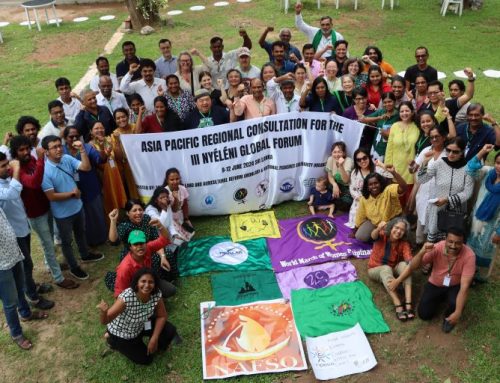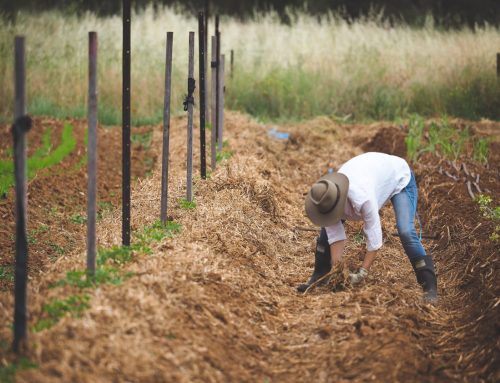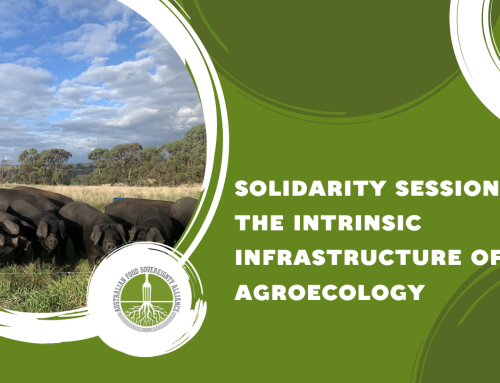 Charles Massy is a farmer and researcher of great importance to Australia. Charles’s ability to write about farmers and farming is perhaps enhanced by his own credentials and experience in farming. Charles’ book “Breaking the Sheep’s Back” documents the collapse of the Australian wool industry. Last year Charles completed his PhD project on Farming and Transformational practice in Australia (titled: “Farming futures: how Australia’s farmers are adapting to change”). This PhD project brings together the many forces that are impacting on farming and land use in Australia in a perspective that ranges from recent years to past eons. Charles’ unique perspective includes European history in Australia, Indigenous history and practice, and the various pressures on today’s farmers that are leading to transformational change in farming practice and in farmers’ understanding of themselves and the Australian continent.
Charles Massy is a farmer and researcher of great importance to Australia. Charles’s ability to write about farmers and farming is perhaps enhanced by his own credentials and experience in farming. Charles’ book “Breaking the Sheep’s Back” documents the collapse of the Australian wool industry. Last year Charles completed his PhD project on Farming and Transformational practice in Australia (titled: “Farming futures: how Australia’s farmers are adapting to change”). This PhD project brings together the many forces that are impacting on farming and land use in Australia in a perspective that ranges from recent years to past eons. Charles’ unique perspective includes European history in Australia, Indigenous history and practice, and the various pressures on today’s farmers that are leading to transformational change in farming practice and in farmers’ understanding of themselves and the Australian continent.
Charles is also part of a newly formed and highly innovative practitioner-researcher collaboration at the Australian National University’s Fenner School of Environment and Society, called ARLASH – Alliance for Regenerating Landscapes and Social Health – http://www.arlash.com/arlash-2014/.
COLLECTIVE THINKING AND COUNTRY
By Charlie Massy, submitted for the Oceania EcoHealth Symposium held at Melbourne University in December 2013. This is a précis of a longer paper, which will published as a chapter in a book to follow the Symposium. For a report on the Symposium, click here
Part of humanity’s massive sustainability challenge is delivering food security. However agriculture is required to achieve this in the face of a number of intractable and amplifying factors. As a contributor to such factors, the dominant industrial practices of agriculture are increasingly recognised as inhibiting Earth’s capacity to continue providing ecosystem services. Clearly, transformational change is required in our society to address this issue.
One pathway to such change is a new broad-acre, ecologically-oriented agriculture that is both regenerating degraded landscapes and delivering high levels of healthy food. This movement is led by a number of innovators who have undergone personal transformation. This has entailed a shift from the dominant Western ‘mechanical’ mind (one that holds nature as dead and passive, allowing control and domination) to a regenerative or ‘Neo-Organic’ world-view.
The ‘Organic’ Legacy in Australia
Over fifty millennia of existence by Aboriginal people have left an unimaginably long-term perspective and associated cultural practices. The result of their ‘organic’ mind (one that holds, reveres and nurtures a living and spiritual Earth as the centre of an organic cosmos) was not just highly sophisticated societies but also a combination of a deep practical knowledge of the environment. This was linked to dynamic relationships within cosmological, religious, belief and kinship systems.
This way of ‘knowing’ resulted in one of the most sophisticated, most widespread and most responsible of continent-wide integrated land-use practices devised anywhere on Earth, and which extended throughout multiple ecosystems and ‘Countries’. However, neither indigenous cultures, their land management, nor these unique co-evolved ecosystems were recognised and understood by post-1788 invaders of this land: people imbued with the post-Enlightenment ‘mechanical’ mind. They are still little understood today, and this has resulted in ongoing destruction of both ecosystems and indigenous societies in Australia. But there is much of value that, with free, prior and informed consent from their traditional custodians, can be learnt from, and collectively used, for regenerative purposes. This includes the indigenous ecological and spiritual concept of Country.
A Neo-Organic Emergence Amongst Australian Regenerative Agriculturalists
The transformational movement of regenerative agriculturalists involved a radical change in Western producers’ world-views, values, ethics, behaviour and land-use practices. This entailed a major metaphor-mind shift from the ‘mechanical’ to the ‘Neo-Organic’: one combining elements of previous ‘organic’ metaphor thinking with new ecological and holistic knowledge. Integral to this shift was transdisciplinary inquiry and holistic, collective thinking which recognised and combined multiple knowledge cultures.
Reconciling the Organic and Neo-Organic implies a Reconciliation with Traditional Owners and with their Countries
Both regenerative agriculturalists and Australia’s indigenous people are collective thinkers. For indigenous people this includes a deep and rigorously-tested natural science. Such thinking is encapsulated in their idea of Country, described as a ‘nourishing terrain’ which gives and receives life; is a timeless entity; and which must be carefully managed for perpetuity.
The still-evolving space of Neo-Organic, collective thinking in agriculture shares a similar deep practical, emotional, ethical, and spiritual motivation for nurturing land as that which distinguishes the indigenous long-term view of Country. Here lies a pathway to healing and regenerating:
1. A reconciliation with, collaboration and learning with, and partnership with indigenous peoples previously dispossessed of their particular Countries.
2. The preserving, reconstruction, nurturing and valuing of indigenous and cross-cultural ecological knowledge.
3. By building on a new sense of ‘place’ and ‘country’ through combining the ‘Organic’ and the ‘Neo-Organic’ minds, this collective thinking (including modern systems-ecology and other scientific knowledge) would greatly enhance an urgently needed and publicly wanted ecological literacy.
These three in combination can move modern land-users and linked urban societies to the idea of all Countries being ‘nourishing terrains’; of ‘Land Care’ in perpetuity. This would help to address multiple elements of the ‘Food Crisis’.
Collective Thinking at a Wider Societal Level: the ARLASH Entity
In combination with the above, collective thinking at a wider societal level is also required. One example in early gestation phase is a non-formally constituted alliance which recently arose at ANU, called ARLASH: an Alliance for Regenerating Landscapes and Social Health. This has brought together a wide spectrum of leaders in their fields: regenerative agriculturalists, biophysical and social scientists, education and policy professionals, indigenous leaders, health and environmental practitioners and others. The alliance was founded on the recognition that new thinking and solutions are required for complex, emergent problems, and because food off non-natural, non-healthy landscapes has deleterious impacts on human health (as does divorcement from a connection with nature). By investing in human capital, ARLASH aims to harness collective knowledge so as to enhance the regeneration of both landscapes and thus societal and human health (both physical and mental).




